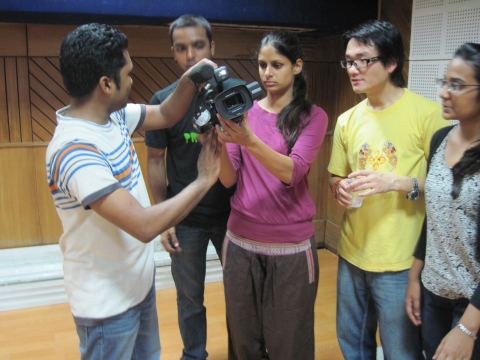
Students at the World Media Academy learn both the basic skills of journalism and the technical multimedia skills they will need to do their jobs in the future.

Students get hands-on experience with the professional equipment that is standard in the journalism industry today.
A brand new facility, the World Media Academy is a work in progress: Only one room has an air conditioner, an appliance that despite the arrival of the autumn equinox, is still much-needed here in Delhi. The electricity ebbs and flows.
None of these inconveniences matter, though. My students are eager to learn how to be flexible journalists in a profession that is now blending print, broadcast and electronic media. But what strikes me most is that their commitment goes beyond a personal desire to succeed. They speak of duty to family, community and country.
We are walking through the basics of Journalism 101 - summary leads, the inverted pyramid, news worthiness and interviewing skills. The students have studied and written profiles and are now working on man-on-the-street surveys.
We analyze political cartoons from around the world, discuss symbolism and point of view. There's also the daily grammar and vocabulary lesson, blog writing, video skills, and soon, pod-casts. Mid-October, we begin an intensive Final Cut Pro video editing workshop.
Once a week students give mini-lectures on topics of interest or news value. This is an opportunity for them to condense a broad subject into a ten-minute oral presentation. It also helps to prepare them for live and taped presentations. We've learned about the Land Act - a bill in parliament that will radically change laws governing land acquisition in India; NREGA, the much-corrupted welfare entitlement scheme that provides for the rural poor, India's largest voting block; and the 2G airwave spectrum scandal that has dominated the news here for months.
And of course, we often talk about the higher ideals of our profession. I want the graduates of WMA to recognize that all people have the right to the free flow of information to improve their lives - to hold leaders and governments and institutions accountable, to understand that information is power. We look at local stories and how they address these ideals.
We also want to connect with other professionals working in Delhi. Later this month, an international health advisor for USAID will meet with WMA to discuss how the press has covered pandemic and infectious disease stories, such as SARS, Ebola and Avian Flu. We are trying to coordinate the lecture with the release of Steven Soderbergh's film Contagion.
The Foreign Correspondents' Club also offers opportunities for collaborative projects with our school.
So there's a lot happening here. We are still under construction, building not just a facility, but a school of eighteen young men and women from India, Bhutan, Nepal, Syria and the US. They are World Media Academy, Delhi.